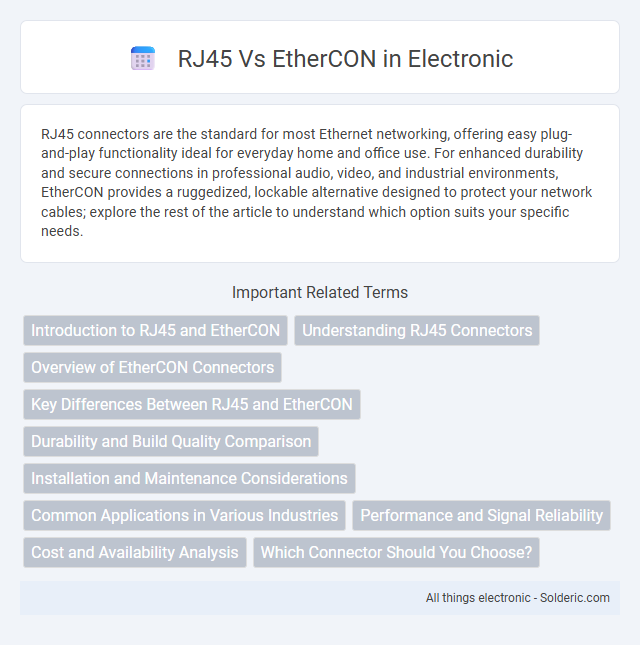RJ45 connectors are the standard for most Ethernet networking, offering easy plug-and-play functionality ideal for everyday home and office use. For enhanced durability and secure connections in professional audio, video, and industrial environments, EtherCON provides a ruggedized, lockable alternative designed to protect your network cables; explore the rest of the article to understand which option suits your specific needs.
Comparison Table
| Feature | RJ45 | EtherCON |
|---|---|---|
| Connector Type | Standard 8P8C modular connector | Ruggedized Neutrik connector with RJ45 compatibility |
| Durability | Low to moderate, plastic housing | High, metal housing with secure locking |
| Use Case | General networking, home and office use | Professional audio, stage, and harsh environment networking |
| Locking Mechanism | Snap-lock tab | Metal latch locking system |
| Compatibility | Compatible with Ethernet cables and ports worldwide | Compatible with standard RJ45 cables, offers enhanced plug retention |
| Cost | Low cost, widely available | Higher cost, specialized use |
| Environmental Resistance | Limited protection | Improved protection against dust, moisture, and mechanical stress |
Introduction to RJ45 and EtherCON
RJ45 connectors are standardized Ethernet connectors widely used for network cables, facilitating reliable data transmission in various applications. EtherCON connectors enhance RJ45 by providing a ruggedized, locking shell designed for professional audio, video, and industrial environments. This design ensures superior durability and secure connections compared to standard RJ45 plugs.
Understanding RJ45 Connectors
RJ45 connectors are standard connectors used primarily for Ethernet networking, featuring an 8-pin modular design that supports data transmission speeds up to 10 Gbps with Cat6a cables. Unlike EtherCON connectors, RJ45 connectors lack ruggedized housing, making them more susceptible to physical damage and environmental factors. Understanding your network environment helps determine whether the simplicity of RJ45 or the durability of EtherCON best suits your connectivity needs.
Overview of EtherCON Connectors
EtherCON connectors are ruggedized RJ45 connectors designed for professional audio, video, and network applications, offering enhanced durability and secure locking mechanisms to withstand harsh environments. Unlike standard RJ45 connectors, EtherCON features a protective metal shell that prevents damage and accidental disconnection, ensuring reliable network performance in demanding settings. Your network installations benefit from EtherCON's robustness and secure fit, making them ideal for stage, studio, and industrial use where stability and longevity are critical.
Key Differences Between RJ45 and EtherCON
RJ45 connectors are standard Ethernet jacks used for typical network cables, offering easy plug-and-play connectivity ideal for office and home environments. EtherCON connectors combine an RJ45 interface with a ruggedized metal housing, delivering superior durability and locking mechanisms for professional audio, video, and industrial applications. You benefit from EtherCON's enhanced protection and secure connection in demanding conditions, while RJ45 suits casual, everyday networking needs.
Durability and Build Quality Comparison
RJ45 connectors, commonly used in standard Ethernet cables, feature plastic housings that provide adequate durability for everyday office and home networking but can be vulnerable to physical damage or disconnection under stress. EtherCON connectors combine the RJ45 interface with a ruggedized metal shell and locking mechanism, significantly enhancing resistance to impact, moisture, and cable strain, making them ideal for demanding professional audio, video, and industrial environments. The robust build quality of EtherCON ensures reliable connections and longer lifespan in harsh conditions compared to the more delicate, plug-and-play design of standard RJ45 connectors.
Installation and Maintenance Considerations
RJ45 connectors offer straightforward installation with standard patch cables and are widely supported across networking equipment, making maintenance simpler due to easy cable replacement and compatibility. EtherCON connectors provide robust locking mechanisms designed for harsh environments, reducing cable disconnections and minimizing downtime during maintenance in professional audio and industrial settings. When deciding for your setup, consider EtherCON for durability and secure connections, while RJ45 suits quick installation and general office or home networking needs.
Common Applications in Various Industries
RJ45 connectors are widely used in office networking, telecommunications, and data centers due to their compatibility with standard Ethernet cables and ease of installation. EtherCON connectors, designed with rugged metal housings, are preferred in the entertainment industry, live event production, and industrial automation for their durability and secure locking mechanism in harsh environments. Choosing the right connector depends on your environment's demand for reliability, physical protection, and frequent cable handling.
Performance and Signal Reliability
RJ45 connectors provide reliable Ethernet performance for most standard networking needs with consistent signal transmission up to 1 Gbps over CAT5e or better cables. EtherCON connectors enhance signal reliability in demanding environments by offering rugged metal housings and secure locking mechanisms that prevent disconnections and shield against electromagnetic interference. This makes EtherCON ideal for professional audio, video, and industrial applications where maintaining stable, high-performance data transmission is critical.
Cost and Availability Analysis
RJ45 connectors are widely available and cost-effective, making them a popular choice for standard networking applications due to mass production and established supply chains. EtherCON connectors, designed for rugged environments, tend to be more expensive and less readily available because they cater to niche markets requiring enhanced durability and secure locking mechanisms. You should weigh the cost against the need for robust performance and environmental resilience when selecting between these two connector types.
Which Connector Should You Choose?
Choose RJ45 connectors for standard Ethernet applications due to their widespread compatibility and cost-effectiveness in typical networking environments. Opt for EtherCON connectors in professional audio, video, and industrial settings where enhanced durability, locking mechanism, and protection against moisture and mechanical stress are critical. Prioritizing the specific requirements of the environment ensures optimal network performance and connection reliability.
RJ45 vs EtherCON Infographic

 solderic.com
solderic.com